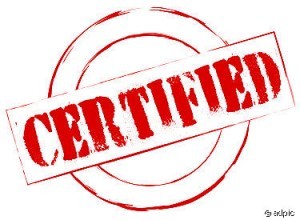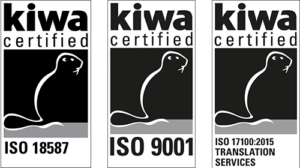 We are regularly contacted by clients requiring a ‘certified translation’. To be able to help, we first need to find out what exactly they require, since there is actually no such thing as a ‘certified translation’. In our industry we only deal with sworn translations, sometimes accompanied by an apostille or other form of legalization. What does all of this involve?
We are regularly contacted by clients requiring a ‘certified translation’. To be able to help, we first need to find out what exactly they require, since there is actually no such thing as a ‘certified translation’. In our industry we only deal with sworn translations, sometimes accompanied by an apostille or other form of legalization. What does all of this involve?
Sworn translation
A sworn translator is a professional whose qualifications permit them to swear their competence before a court and to then have their name added to the national register of sworn translators and interpreters (‘the RBTV’) as required by the Dutch Ministry of Security and Justice. Such a translator is authorized to make a declaration as to the truth and accuracy of the translation. The law requires that this declaration, accompanied by an official stamp and signature, be ‘irremovably attached’ to the translation and the original document. This is most frequently done using special rivets, or paper seals and ribbon. There may even be one or two translators who preserve the old tradition of using sealing wax.
The result is a sworn translation, a document that is accepted without problem by most official bodies in the Netherlands.
Outside the Netherlands
If the translation is intended to be used abroad, the situation is different. Even though the sworn translation is still valid, it is also necessary to prove that the translator’s signature is authentic, since foreign institutions are not able to ascertain this fact from the Dutch court where the translator has sworn their oath. This adds another layer of complication.
Apostille
In 1961, to simply the process of authenticating documents, 109 nations signed up to the Hague Convention. If a sworn translation is intended for any such nation, the signature of the translator can be authenticated by attaching a special stamp (an ‘apostille’) to the document. The apostille is issued by the registrar of the court at which the translator’s signature is registered. An apostille can usually be obtained from the court within a day.
Legalization
If the translation is intended for a nation that is not a party to the Hague Convention, the procedure is more complex. ‘Legalization’ of the document is required, bearing the signature of the President of the Court, and thereafter signed on behalf of the Ministry of Security and Justice, and then on behalf of the Ministry of Foreign Affairs, before final signature by the embassy of the nation for which it is intended. It’s safe to assume, therefore, that the legalization of a sworn translation is a big undertaking.
Is there any simpler solution?
If all of this seems too complicated to understand, all you need do is contact us to ask for a ‘certified translation’ and leave the rest to us. No one will know what a ‘certified translation’ is, but we guarantee to provide you with exactly what you do need.



